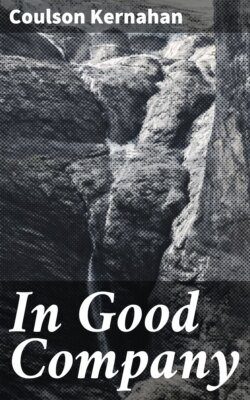Читать книгу In Good Company - Coulson Kernahan - Страница 6
На сайте Литреса книга снята с продажи.
II
ОглавлениеTable of Contents
Of all controversialists (and he dearly loved a verbal encounter) to whom I have ever listened, Swinburne was incomparably the most crushing. He fought with scrupulous and knightly fairness, never stooping to take a mean advantage of an adversary, and listening patiently, punctiliously even, while the other side was making its points. But, when his turn came, he carried everything before him. Vesuvius in eruption could not more effectually overwhelm or consume the rubble around its crater than Swinburne could scarify or sweep away, by a lava-torrent of burning words, the most weighty arguments of his opponents.
So, too, with his conversation. When he was moved by his subject, when he talked in dead earnest, he did nothing else. He forgot everything. In the middle, or even at the beginning of a meal, he would lay down knife and fork, and turn to face his listener, quite oblivious of, or indifferent to the fact that his dinner or lunch was spoiling.
On one occasion I happened, half-way through lunch, to mention that I had in my pocket a copy of Christina Rossetti’s latest poem, written in memory of the Duke of Clarence, and entitled The Death of a First-born.
Down went knife and fork as he half rose from his chair to stretch a hand across the table for the manuscript.
“She is as a god to mortals when compared to most other living women poets,” he exclaimed in a burst of Swinburnian hyperbole.
Then in his thin, high-pitched but exquisitely modulated and musical voice he half read, half chanted two verses of the poem in question:
One young life lost, two happy young lives blighted
With earthward eyes we see:
With eyes uplifted, keener, farther-sighted
We look, O Lord, to Thee.
Grief hears a funeral knell: Hope hears the ringing
Of birthday bells on high.
Faith, Hope and Love make answer with soft singing,
Half carol and half cry.
Then he stopped abruptly.
“I won’t read the third and last verse,” he said. “One glance at it is sufficient to show that it is unequal, and that the poem would be stronger and finer by its omission. But for the happy folk who are able to think as she thinks, who believe as she believes on religious matters, the poem is of its kind perfect. Let me read that second verse again,” and with glowing eyes, with hand marking time to the music, he read once more:
Grief hears a funeral knell: Hope hears the ringing
Of birthday bells on high.
Faith, Hope and Love make answer with soft singing,
Half carol and half cry.
The last line, “Half carol and half cry,” he repeated three times, lowering his voice with each repetition, until at last it was little more than a whisper, and so died away, like the undistinguishable ceasing of far-off music.
Laying the manuscript reverently beside him, he sat perfectly still for a space and with brooding beautiful eyes. Then rising without a word he stole silently, softly, almost ghost-like, but with short, swift steps out of the room.
